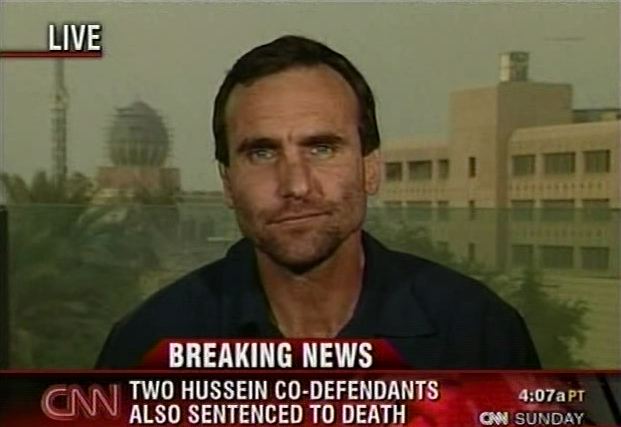SUN: More on the Saddam verdict

Click photo to play
Length: 4:42
T.J. HOLMES: The verdict, guilty. The sentence, death for former Iraqi president Saddam Hussein. The deposed dictator was convicted of crimes against humanity for a brutal crackdown in 1982.
CNN's Michael Ware is live in Baghdad with more on the verdict and now the reaction to it -- Michael.
MICHAEL WARE, CNN CORRESPONDENT: Yes, T.J., Saddam Hussein, his half-brother, who was the head of the intelligence service in 1982 at the time of the Dujail incidents that these crimes against humanity have come from, and the head of the then-Revolutionary Court have all been found guilty of those crimes against humanity and sentenced to death. Another senior official from Saddam's regime, the former vice president, has been sentenced to life imprisonment.
Three local Ba'athist officials from that, area at that time, have been sentenced to 15 years imprisonment. And one other lower official was acquitted.
In the fallout from this decision which was made for Saddam Hussein, the guilty verdict, and then the sentence of death imposed at midday, just three hours ago, and then broadcast 20 minutes later on Iraqi TV, started with some celebratory fire here in the capital, Baghdad. But we've since seen tumultuous scenes of celebration and jubilation in other parts of the country that are not currently under an intense security clampdown, as is the capital and two Sunni- dominated provinces.
However, in the capital itself, Baghdad, in the area known as Sadr City, which is not under government control or American military control, but is controlled by a Shia militia, there's been great celebration. As there has been in southern Shia cities, and is almost certainly under way in the Kurdish north.
Both those Iraqi communities, the Shias and the Kurds, were victimized heavily by Saddam's regime. And most people will be seeing this as vindication for all that they've suffered and all that they've endured since the fall of his regime. This has been taken not just as a verdict or an indictment on the events in Dujail in 1982, but for the entirety of Saddam's regime -- T.J.
HOLMES: Well, Michael, how relevant is Saddam Hussein still? How much -- how important, or is he, in the country still as a symbolic figure, since the country is I guess really wrapped up in so many other issues -- political issues, security issues, sectarian violence -- is he still relevant?
WARE: Well, T.J., in terms of this war, in terms of the daily grind of violence, in terms of the U.S. casualties, in terms of the monthly slaughter of Iraqis in the hundreds, and indeed thousands, Saddam himself bears little, if any, relevance. I mean, there's a symbolic nature to Saddam in terms of representation of the Sunni minority here in this country. However, in terms of groups who are fighting for Saddam, or are looking for a return of his regime, they are minute, if indeed there are any of them out there in the first place.
This war, both the insurgent war, the war that's become a civil war, and also the confrontations with the Shia militias and the death squads, have nothing to do with Saddam. The true value of this is to show by the Iraqi government a real display of authority. And that to some degree there will be accountability, not just for the leadership of the old regime, but implicitly for the leadership of any future regime that dares to attempt to commit crimes against humanity.
The idea is, through this trial, to showcase and hopefully instill a sense of the rule of law in this country, albeit with government-backed death squads still roaming and plaguing much of the country. So it is hoped that still, something of at least a broad symbolic nature will be taken from this trial and from this historic verdict -- T.J.
HOLMES: Yes.
Michael Ware for us in Baghdad on another historic day for that country.
Michael, thank you so much.
